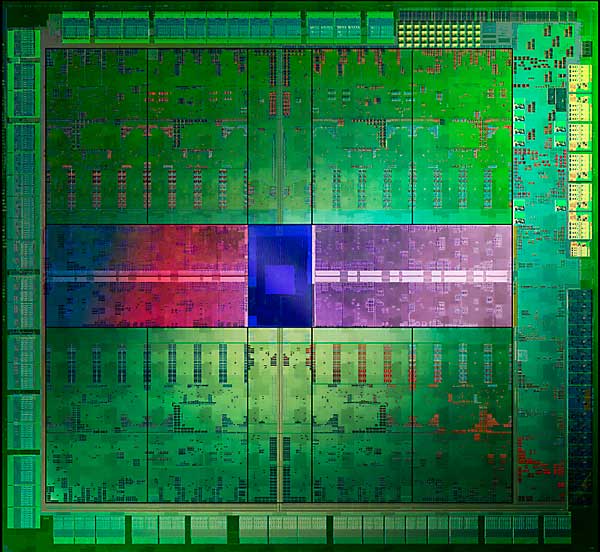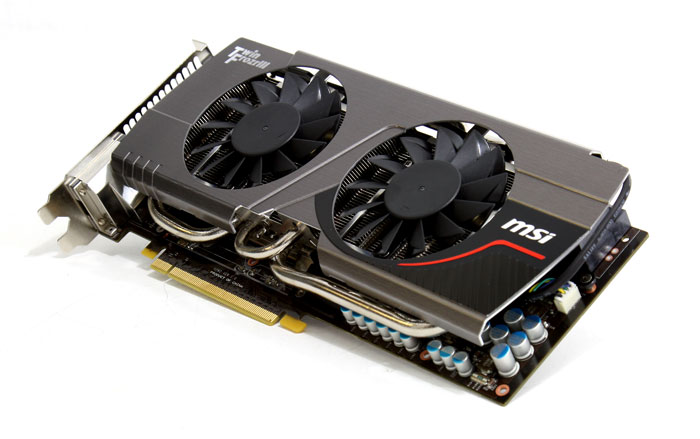Technology and Specs
Technology and Specs
The GeForce GTX 680 is based on the new Kepler GPU architecture. Interestingly enough it is based on the 28nm GK104 GPU which typically would have indicated a mid-range product. The 10" long GeForce GTX 680 boasts an impressive 1536 CUDA (shader) cores. The product is obviously PCI-Express 3.0 ready and has a TDP of around 195W with a typical draw of 170W. But let me first show you GK104:
 NVIDIA GK104 Kepler architecture GPU
NVIDIA GK104 Kepler architecture GPU
As far as the memory specs of the GK104 Kepler GPU are concerned, the boards will feature a 256-bit memory bus connected to 2 GB of GDDR5 video buffer memory, but later versions will also be available with 4 GB of VRAM. On the memory controller side of things you'll see very significant improvements as the reference memory clock is now set at 6 GHz / Gbps. This boils down to to a memory bandwidth of 192 GB/s on that 256-bit memory bus. It's actually similar bandwidth to the GeForce GTX 580.
An immediate difference to the GPU core versus the shader processor domain is that both will be clocked at 1:1, meaning both the core and shader domain clock in at 1006 MHz, that means that the 2x shader hotclock from the last generation products is a thing of the past. One clock to rule them all (well internally there are dozens of different other clocks really, but let's keep it simple).
With this release, NVIDIA now has the first series 600 cards on its way. The new graphics adapters are of course DirectX 11.1 ready. With Windows 8, 7 and Vista also being DX11.1 ready all we need are some games to take advantage of DirectCompute, multi-threading, hardware tessellation and the latest shader 5.0 extensions.
For your reference here's a quick overview of some past generation high-end GeForce cards opposed to the new Kepler based GeForce GTX 680.
| GeForce GTX 285 |
GeForce GTX 480 |
GeForce GTX 580 |
GeForce GTX 680 |
MSI GTX 680 OC TFIII | |
| Stream (Shader) Processors | 240 | 480 | 512 | 1536 | 1536 |
| Core Clock (MHz) | 648 | 700 | 772 | 1006 | 1058 |
| Shader Clock (MHz) | 1476 | 1400 | 1544 | 1006 | 1058 |
| Boost Clock | - | - | - | 1058 | 1176 |
| Memory Clock (effective MHz) | 2400 | 3700 | 4000 | 6000 | 6000 |
| Memory amount | 1024 MB | 1536 | 1536 | 2048 | 2048 |
| Memory Interface | 512-bit | 384-bit | 384-bit | 256-bit | 256-bit |
| Memory Type | gDDR3 | gDDR5 | gDDR5 | gDDR5 | gDDR5 |
| HDCP | Yes | Yes | Yes | Yes | Yes |
| Two Dual link DVI | Yes | Yes | Yes | Yes | Yes |
| HDMI | No | Yes | Yes | Yes | Yes |
For Kepler, NVIDIA kept their memory controllers GDDR5 compatible. Memory wise NVIDIA has nice large memory volumes due to their architecture, we pass 2 GB as standard these days for most of NVIDIA's series 690 graphics cards.
The hardware engineers of NVIDIA reworked the memory subs system quite a bit, enabling much higher memory clock frequency speeds compared to previous generation GeForce GPUs. The result is this memory speeds up-to 6 Gbps. Each memory partition utilizes one memory controller on the respective GPU, which will get 256/512 MB of memory tied to it. There is word that a 4 GB version will be manufactured as well.
- The GTX 580 has six memory controllers (6x256MB) = 1536 MB of GDDR5 memory
- The GTX 680 has four memory controllers (4x512MB) = 2048 MB of GDDR5 memory

